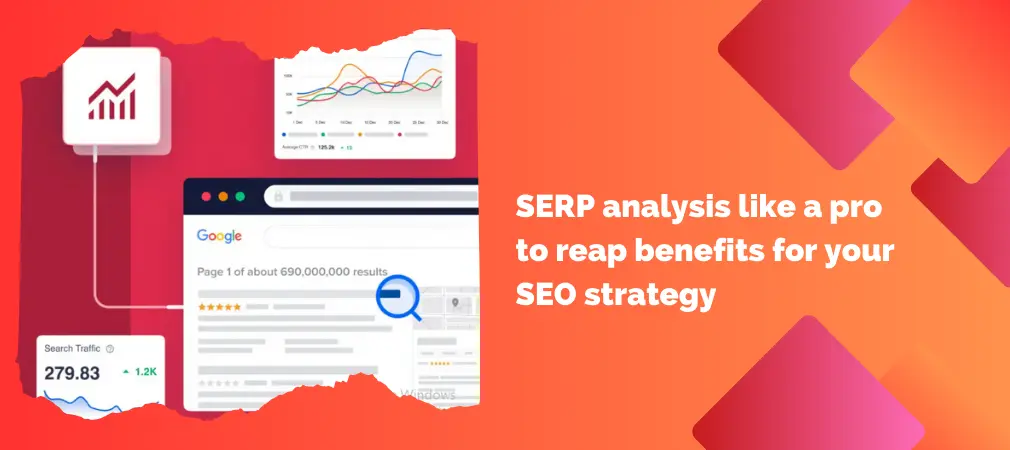Master SERP Analysis for Superior SEO Results
Updated on 21th July, 2024

190k views


10 min Read
Introduction

share

Search Engine Results Pages (SERPs) are the battleground where businesses vie for visibility, traffic, and ultimately, conversions. Understanding and analysing SERPs is crucial for developing an effective Search Engine Optimization (SEO) strategy. A professional SERP analysis helps you understand how search engines rank content, identify opportunities for improvement, and gain insights into your competition. This article will guide you through the process of conducting a comprehensive SERP analysis, highlight its benefits, and provide actionable strategies to optimise your SEO efforts.
But the benefits extend beyond just ranking higher. A deeper understanding of SERPs allows you to tailor your content to searcher intent. By analysing the types of content that currently rank well for your target keywords, you can identify what information users are seeking and ensure your content addresses those specific needs. This not only improves your chances of ranking well but also leads to a more satisfying user experience, which can ultimately translate into higher conversion rates and brand loyalty.
What is SERP Analysis?
SERP analysis involves examining the search engine results pages for specific keywords to understand the types of content that rank highly and the factors contributing to their ranking. This analysis provides insights into search intent, keyword competition, content gaps, and opportunities for improving your own website's performance. But it's not just about looking at the top results. A comprehensive SERP analysis also considers the different features displayed on the page. This can include things like featured snippets, image packs, and local results. By understanding how these features function and how to optimise your content for them, you can increase your website's visibility in a wider range of search results, attracting a more diverse audience and driving even greater traffic.
Importance of SERP Analysis
Examining Search Engine Results Pages (SERPs) can be a goldmine for crafting a winning content strategy. By analysing these results, you can unlock valuable insights into user intent. This allows you to tailor your content to directly address what users are searching for. Additionally, SERP analysis sheds light on your top competitors, revealing their strengths and weaknesses, and informing your own approach. You can also gain valuable intel on the types of content that resonate with search engines, guiding your content creation efforts towards formats like articles, videos, or infographics that are proven to rank well. Furthermore, analysing SERPs helps you identify areas where your own content and SEO strategies can be improved, allowing you to close any gaps and climb the search rankings. Finally, you can use these insights to refine your keyword strategy, focusing on keywords that are both relevant to your content and offer a good balance of competitiveness and search volume. By incorporating SERP analysis into your content strategy, you gain a powerful tool to create content that resonates with users and search engines alike.
Steps to Conduct a Professional SERP Analysis
1. Identify Target Keywords
Start by selecting the keywords relevant to your business and SEO goals. Use tools like Google Keyword Planner, SEMrush, or Ahrefs to find keywords with high search volume and relevance to your niche.
2. Analyse the SERP Layout
Examine the structure of the SERP for your target keywords. Note the presence of different features such as:
- Organic Results: Traditional blue links to webpages.
- Paid Ads: Sponsored listings at the top or bottom of the page.
- Featured Snippets: Boxes displaying direct answers to queries.
- Knowledge Panels: Information boxes on the right side of the SERP.
- Local Packs: Maps and local business listings.
- Image and Video Results: Media elements that appear in the SERP.
Understanding the SERP layout helps you identify which types of content and SEO techniques are most likely to be effective.
3. Examine Top-Ranking Pages
Dive deeper into the top 10-20 results for your target keywords. Analyse various aspects such as:
- Content Quality: Evaluate the depth, accuracy, and usefulness of the content.
- User Experience: Look at site speed, mobile-friendliness, and overall design.
- On-Page SEO: Check keyword usage, meta tags, headers, and URL structures.
- Backlinks: Use tools like Ahrefs or Moz to analyze the backlink profiles of these pages.
- Social Signals: Observe social media engagement and shares.
4. Assess Search Intent
Determine the search intent behind the top-ranking pages. Search intent can generally be classified into four types:
- Informational: Users looking for information (e.g., "how to cook pasta").
- Navigational: Users looking for a specific website or page (e.g., "Facebook login").
- Transactional: Users looking to make a purchase (e.g., "buy iPhone 13").
- Commercial Investigation: Users researching products or services before making a purchase decision (e.g., "best DSLR cameras 2024").
Align your content strategy to match the identified search intent for your target keywords.
5. Identify Content Gaps and Opportunities
Look for gaps in the content of top-ranking pages that you can exploit. This might include:
- Missing Information: Areas where competitors' content lacks depth.
- Different Formats: Opportunities to present information in a different format, such as videos, infographics, or interactive content.
- Long-Tail Keywords: Target less competitive, long-tail keywords that are still relevant to your audience.
6. Analyse SERP Features
SERP features like featured snippets, knowledge panels, and local packs can significantly impact click-through rates. Determine if and how these features appear for your target keywords and strategize on how to capture them. For instance, structuring your content to answer questions directly can increase your chances of appearing in a featured snippet.
7. Monitor and Adapt
SERPs are dynamic and constantly evolving. Regularly monitor the SERPs for your target keywords to stay updated on changes and adapt your strategy accordingly. Use tools like Google Search Console, Moz, or SEMrush to track your rankings and identify fluctuations.
Benefits of Professional SERP Analysis
Improved Keyword Strategy A thorough SERP analysis helps refine your keyword strategy by focusing on keywords that are relevant, have high search intent, and are achievable given your site’s authority and resources. This strategic approach can lead to more effective SEO efforts and better rankings.
Enhanced Content Quality
By understanding what top-ranking pages are doing well, you can elevate your content quality. This means creating comprehensive, engaging, and valuable content that not only meets but exceeds user expectations.
Better User Experience
Insights gained from SERP analysis can inform improvements to your website’s user experience. This includes optimising site speed, enhancing mobile responsiveness, and ensuring a user-friendly design, all of which contribute to better rankings.
Competitive Advantage
Understanding your competitors’ strengths and weaknesses allows you to identify opportunities to outperform them. This might involve targeting underserved areas, improving on their content, or adopting more effective SEO practices.
Increased Organic Traffic
Effective SERP analysis leads to improved rankings, which in turn increases your website’s visibility and organic traffic. Higher visibility means more clicks, more engagement, and ultimately more conversions.
Conclusion
Mastering SERP analysis is a critical component of a successful SEO strategy. By understanding the intricacies of search engine results pages, identifying opportunities, and continuously adapting to changes, you can significantly enhance your website’s performance and achieve your business goals.
Are you ready to elevate your SEO strategy with professional SERP analysis? Begin by identifying your target keywords, thoroughly examining the SERP layout, and diving deep into top-ranking pages. Leverage these insights to refine your content, enhance user experience, and outpace your competition. Don't wait – start your SERP analysis journey today and unlock the full potential of your SEO efforts. Contact us to learn more about how we can help you master SERP analysis and drive your skills forward with Lejhro bootcamp.
Bootcamps
Bestseller
Digital Marketing Course
Start Date :Aug 09, 2025
Duration :4 Months
Bestseller
Data Analyst Course
Start Date :Aug 09, 2025
Duration :4 Months
Suggested Blogs
The Growing Role of Marketing Chatbots and AI in Modern Digital Marketing
Updated on 21th July, 2024

190k views

10 min Read
Understanding Functions and Benefits of Apache Spark in Big Data Tools
Updated on 20th July, 2024

111k views

10 min Read
The Growing Role of Marketing Chatbots and AI in Modern Digital Marketing
Updated on 21th July, 2024

190k views

10 min Read
More Blogs
© 2025 LEJHRO. All Rights Reserved.






